World
EU Urges U.S. to Restore Fair Competition Environment; Will Launch Retaliatory Measures if Tariff Talks Fail
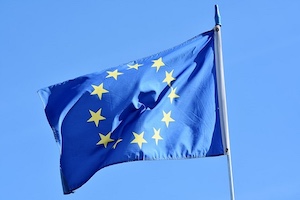
European Commission Vice President for Trade Maroš Šefčovič stated on May 6 that the European Union will not accept an unfair deal from the United States under pressure. If the two sides fail to reach a consensus through negotiations, the EU will defend its interests and implement balancing measures. This signals that the EU is prepared with contingency plans in response to a potentially uncompromising U.S. stance. According to *Bloomberg*, if negotiations fail, the EU may be ready with a €100 billion retaliation list.
Currently, the U.S. imposes a 25% tariff on EU imports of steel, aluminum, and automobiles. Most other goods are subject to a "reciprocal tariff" of 10%, which is set to increase to 20% after a 90-day grace period. More than 70% of EU exports to the U.S.—worth around €380 billion—are already affected. If additional categories such as pharmaceuticals and semiconductors are included, this could cover over 97% of goods, totaling approximately €549 billion. The total value of tariffs imposed could reach €100 billion. In comparison, U.S. tariffs on EU goods in 2024 were only €7 billion.
Šefčovič asserted that the EU is not backing down, noting that it is actively negotiating free trade agreements with Asian countries including India, Indonesia, the Philippines, Thailand, and Malaysia. "All countries want to accelerate their agreements with the EU," he said. He also mentioned that the EU has established a task force to monitor "trade diversion effects" caused by U.S. tariffs, with a report expected in mid-May.
So far, the EU has not taken retaliatory actions against the U.S., but has publicly threatened to impose tariffs worth \$21 billion on U.S. goods in response to the 25% tariffs on steel, aluminum, and automobiles imposed by the Trump administration. Šefčovič emphasized that the EU continues to show sincerity in resolving the dispute, such as proposing that both sides reduce import tariffs to zero across the board—including for strategic industries like automobiles; work together to address global overcapacity issues in sectors such as steel and aluminum; and jointly enhance the resilience of the transatlantic supply chains for semiconductors, pharmaceuticals, and other industries. He urged the U.S. to pursue a fair and balanced solution, warning that “we are ready with alternatives to restore a fair competitive environment” if not.
- Read more
- 45 reads
U.S.-Japan Tariff Negotiations Reach Impasse as Japan’s Request for Exemption Is Rejected
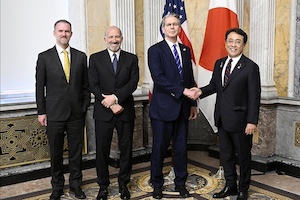
The Trump administration in the United States has announced a 10% reciprocal tariff on all imported goods, with an additional 14% imposed specifically on Japanese imports. Despite Japan’s active push for an exemption, the U.S.-Japan tariff negotiations have reached a stalemate, with the U.S. refusing to make any concessions.
According to Japan’s Kyodo News, the second round of cabinet-level tariff negotiations between the U.S. and Japan was held on May 2 at the U.S. Department of the Treasury and lasted two hours. The U.S. was represented by Treasury Secretary Scott Bessent and Trade Representative Jamieson Greer, while Japan was represented by Economic Revitalization Minister Ryosei Akazawa.
After two rounds of talks, the U.S. explicitly rejected Japan’s request to negotiate an exemption from the 10% reciprocal tariff. Tariffs on automobiles and steel were excluded from the negotiations. The U.S. only agreed to negotiate the possibility of postponing the additional 14% tariff until July 9. However, this tariff would not be reduced to zero—only a potential reduction or an extension of the grace period would be considered.
Additionally, on April 2, the Trump administration officially announced its tariff policy, imposing a 10% tariff on all imported goods from all countries and regions. Higher rates were imposed on countries deemed to levy high tariffs on U.S. goods—China at 34%, South Korea at 25%, Japan at 24%, the European Union at 20%, and Taiwan at 32%. The policy took effect at midnight on April 9, Eastern Time. However, Trump later announced a 90-day suspension of full implementation, citing that over 75 countries had sought negotiations and refrained from retaliatory measures. During this period, only the 10% tariff would be applied.
- 38 reads
Trump Denies Bid for Third Term, Names Vance or Rubio as Potential Successor
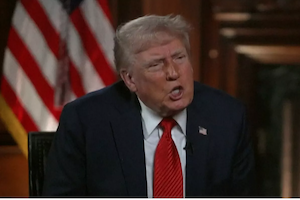
In an interview with NBC’s Meet the Press on May 4, U.S. President Donald Trump stated he does not intend to seek a third presidential term, acknowledging for the first time that such a move would violate the 22nd Amendment of the Constitution. He hinted that Vice President J.D. Vance or Secretary of State Marco Rubio could be ideal successors, while downplaying speculation about 2028 campaign merchandise and expressing uncertainty about the constitutional term limit's legitimacy.
In addition to softening his tone on the re-election issue, Trump has also shifted on personnel matters. He adopted a more restrained stance toward Federal Reserve Chair Jerome Powell, stating he would not replace him before his term ends in 2026. On foreign policy, however, Trump remained assertive, expressing continued interest in acquiring Greenland—even hinting at potential military action—and reiterating his hope for Canada to become the 51st U.S. state.
On U.S.-China trade, Trump made a rare statement suggesting that tariffs on Chinese goods might be lowered in the future to preserve bilateral commerce. While stressing China’s current economic struggles, he said he remains open to a fair trade deal, and noted he would not be speaking with Chinese President Xi Jinping this week.
- 75 reads
Albanese Becomes Australia's First Re-Elected PM in 20 Years as Labor Pulls Off Dramatic Comeback Victory
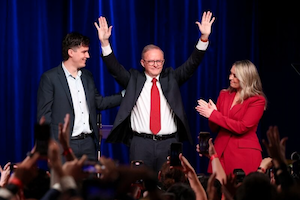
Australia held its federal election on the 3rd, with incumbent Prime Minister Anthony Albanese leading the ruling Labor Party to re-election victory, making him the first Australian prime minister in over two decades to win a consecutive term. According to projections by the Australian Broadcasting Corporation (ABC), Labor is expected to increase its seats in the 150-member House of Representatives from 77 to at least 85—surpassing the majority threshold and securing stable governance.
Analysts suggest that former U.S. President Donald Trump's aggressive tariff policies and the resulting market instability made Australian voters uneasy, leading them to favor the current government. During the campaign, Albanese took a firm stance against Trump’s trade policies and attempted to brand the opposition Liberal Party as pro-Trump—possibly a key factor in Labor’s dramatic turnaround.
Liberal-National coalition candidate Peter Dutton echoed Trump-like policies on reducing immigration and cutting public sector jobs but failed to gain enough voter support. Albanese’s campaign strategy successfully appealed to centrist voters, allowing Labor to overcome months of lagging in the polls and ultimately secure a decisive victory just weeks before the election.
This election marks not only a significant turning point in Australian politics but also highlights the influence of global affairs on voter decision-making. In his second term, Albanese will continue to face economic challenges, particularly the impact of U.S. tariff policies on Australia’s economy.
- 95 reads
Germany's New Chancellor Faces Doubt: 56% Lack Confidence in Merz
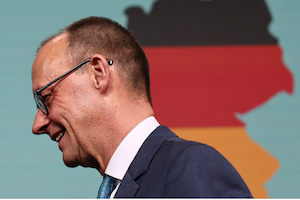
According to recent reports from multiple media outlets, Germany's incoming Chancellor Friedrich Merz is facing a serious challenge in public opinion. The latest polls indicate that between 56% and 60% of German voters lack confidence in his leadership abilities, a figure that has also raised concern within his own party, the Christian Democratic Union (CDU).
Merz’s CDU/CSU alliance won the federal election on February 23, 2025, with 28.5% of the vote and is expected to take office officially on May 6. In order to form a government, he reached a grand coalition agreement with the Social Democratic Party (SPD), covering reforms such as tax cuts, defense investment, and immigration policy. However, the agreement has been met with controversy within the SPD, with only 56% of party members participating in the ratification vote—reflecting a lack of enthusiasm at the grassroots level.
Public skepticism toward Merz centers largely on his shift in stance regarding fiscal discipline. While he previously advocated for strict budgetary control, during coalition talks he proposed a €1 trillion public investment plan—an initiative critics say contradicts his conservative image. Furthermore, his hardline approach to immigration has sparked controversy, particularly his support for a restrictive immigration proposal backed by the far-right Alternative for Germany (AfD), breaking a long-standing political taboo against cooperation with extremist parties.
On foreign policy, Merz has called for Europe to enhance its independent defense capabilities and reduce reliance on the United States, even questioning whether NATO's current structure remains suitable for today's security landscape. His position has stirred debate both domestically and abroad.
Meanwhile, support for the far-right AfD has surged, with the party surpassing the CDU in national polls for the first time to become Germany’s most popular political force. This trend highlights growing voter dissatisfaction with traditional parties and presents an additional challenge to the Merz administration.
Overall, Merz is stepping into a role fraught with both political and economic pressure. Domestically, he must navigate ideological divides between conservatives and centrists within his coalition. Internationally, he will need to respond to shifts in U.S. policy and their implications for European security. His leadership will face a critical test in the coming months.
- 53 reads
U.S. National Security Advisor Dismissed and Reassigned as UN Ambassador Following Group Chat Leak Incident

U.S. National Security Advisor Mike Waltz was recently dismissed after mistakenly adding a journalist to a White House senior officials' communication group, which led to the leak of classified plans including U.S. military airstrikes on Yemen. On the afternoon of May 1, President Donald Trump announced via social media that he would nominate Waltz as the next U.S. Ambassador to the United Nations. In the interim, Secretary of State Marco Rubio will temporarily take over the role, marking the first senior official to be dismissed since Trump’s return to the White House.
In his announcement, Trump stated that Waltz has always prioritized national interests—whether serving on the battlefield, in Congress, or as National Security Advisor—and expressed confidence that he would perform equally well in his new role. Trump also announced that during the transition, Secretary of State Marco Rubio would serve concurrently as National Security Advisor, making him the first U.S. official to hold both roles simultaneously since Henry Kissinger.
In March, Waltz mistakenly added *The Atlantic* editor-in-chief Jeffrey Goldberg to a group chat on the encrypted messaging app Signal. Goldberg later published a report in *The Atlantic* revealing contents of the conversation, including sensitive discussions among top officials about military strike plans on Yemen—such as targets, timing, and weaponry. Waltz later admitted in an interview that he had initiated the group chat but had not intended to add Goldberg, taking full responsibility for the incident.
After news of his reassignment broke, Waltz stated in a post that he was honored to continue serving President Trump and his administration. Since the nomination for U.S. Ambassador to the United Nations requires confirmation by the Senate, Waltz will lose access to the White House’s Oval Office if his appointment is approved.
- Read more
- 77 reads
U.S. and Ukraine Sign Mineral Agreement, Jointly Invest in Post-War Reconstruction

On April 30, the U.S. Department of the Treasury issued a statement announcing that Treasury Secretary Scott Bessent and Ukraine’s First Deputy Prime Minister and Minister of Economy, Yulia Svyrydenko, had officially signed an agreement. The two countries will jointly invest in Ukraine’s mineral resources, including oil, natural gas, and other natural assets. The agreement establishes the "U.S.-Ukraine Reconstruction Investment Fund," aimed at enabling "both countries to collaborate and co-invest to ensure that our shared assets, talents, and capabilities accelerate Ukraine’s economic recovery."
While the latest version of the agreement does not provide Ukraine with any specific security guarantees, it does affirm that Kyiv and Washington agree the pact confirms a "long-term strategic alliance" between the two nations and underscores the U.S. commitment to "Ukraine’s security, prosperity, reconstruction, and integration into the global economic framework." The agreement makes no mention of Europe’s largest nuclear power plant, Zaporizhzhia.
An earlier version of the agreement, submitted by Bessent to Ukrainian President Volodymyr Zelenskyy in February, was rejected. That version framed the deal as a way for Washington to recoup the costs of military aid to Ukraine and lacked assurances regarding Ukraine’s future security. After revisions, a preliminary version was scheduled for signing during Zelenskyy’s visit to the U.S. in February. However, those plans were derailed when Donald Trump and Vice President JD Vance harshly criticized Zelenskyy during a live media event.
The latest draft adjusts several key aspects from previous versions, including changes in language and the removal of provisions that would have violated EU laws by offering preferential treatment to U.S. investors. Additionally, it eliminates the clause that previously required Ukraine to repay the U.S. for past military aid.
According to AFP, Ukrainian Prime Minister Denys Shmyhal said on state television that the agreement is "fair, equal, and mutually beneficial." He emphasized that "the two countries will establish a reconstruction investment fund, with each side holding 50% of the voting rights. All profits from the fund will be reinvested into Ukraine." He also stressed that "Ukraine retains full control over its underground resources, infrastructure, and natural assets," and will not be required to repay any "debt" stemming from the billions of dollars in weapons and other aid the U.S. has provided since Russia’s full-scale invasion in February 2022.
- Read more
- 34 reads
Liberal Leader Carney Wins Canadian Election, Vows to Triumph in U.S.-Canada Trade War
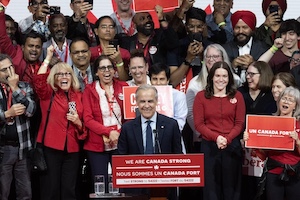
Canada held its 45th federal House of Commons election on the 28th, in which the Liberal Party, led by incumbent Prime Minister Mark Carney, secured a majority of seats, ensuring Carney's re-election. In his victory speech, Carney emphasized the need for national unity in the face of threats from the United States. He stated bluntly that U.S. President Donald Trump wants Canada's land, resources, and sovereignty—but firmly declared that such ambitions will never be realized.
Pierre Poilievre, leader of the Conservative Party of Canada, conceded defeat in the federal election and stated that he would work with the Liberal government to confront President Trump’s trade war and annexation threats. According to international media reports, Poilievre stressed that the Conservatives would focus on defending Canada’s interests by cooperating with the Prime Minister and other parties to resolve tariff issues and protect national sovereignty.
In the election held on the 28th, all 343 seats in the House of Commons were contested. The ruling Liberal Party won 168 seats, securing victory, with Carney continuing as Prime Minister. The Conservative Party came in second with 144 seats. However, the Liberals fell short of the 172 seats needed for a majority, and will need to form a coalition government with other parties. This marks the fourth consecutive election victory for the Liberal Party.
Trump’s tariff threats and remarks about Canada becoming the “51st state” sparked a wave of patriotism across the country, boosting Carney’s popularity. Running on his strong economic credentials, Carney campaigned on reducing Canada’s dependence on the U.S., while the Conservatives focused on issues such as the housing crisis and the rising cost of living. Carney previously served as the governor of both the Bank of Canada and the Bank of England.
The Liberal victory is seen as driven by voter resistance to the Conservatives, backlash against Trump’s tariff policies, and the return of center-left voters after former Prime Minister Justin Trudeau’s resignation. While the election highlighted the growing strength of the Conservatives, minority governments in Canada often face challenges to long-term stability.
- Read more
- 76 reads
EU's Top Court Rules Malta's Sale of "Golden Passports" Illegal

On April 28, the European Court of Justice, the highest court in the European Union, ruled that the Republic of Malta's sale of so-called "golden passports" violates EU law and ordered the immediate termination of the program. The court stated that selling these passports amounts to turning nationality and EU citizenship into a commercial transaction, undermining trust and cooperation among member states.
The court ruled that Malta’s long-running "golden passport" scheme contravenes EU regulations. The program allowed non-EU nationals to obtain Maltese citizenship through investment, thereby granting them free movement and residency rights across EU member states.
The court acknowledged that the granting of nationality falls within the sovereign rights of member states. However, it emphasized that if such actions affect the collective interests and identity of the EU, they must adhere to fundamental EU legal principles. The ruling stressed that Malta’s approach treats EU citizenship as a commodity, violating the “genuine link principle” and core EU values.
The case was brought by the European Commission, which accused the Maltese government of granting citizenship solely based on investment, without requiring genuine residence, language skills, or cultural integration. The Commission argued this practice poses risks to the EU system, including money laundering, tax evasion, and security vulnerabilities.
The Maltese government expressed "regret" over the ruling but pledged to comply with the decision and review its policies accordingly. Over the past decade, Malta’s golden passport program has attracted hundreds of wealthy applicants from Russia, China, the Middle East, and elsewhere, generating hundreds of millions of euros in revenue.
The European Commission welcomed the ruling, calling it a significant legal precedent for other member states still operating similar schemes. It stated that it will step up scrutiny of nationality and residency programs across the EU to ensure legal consistency and safeguard the Union’s security.
- Read more
- 44 reads
Reuters: Papal Conclave to Begin as Vatican Convenes Consistory on May 7

On April 28, the Vatican announced that the papal conclave to elect a new pope will begin on May 7. The conclave will take place in the Sistine Chapel and may last several days. Prior to this, more than 180 cardinals had been engaged in informal meetings in Rome, where they reached a consensus to convene the conclave. According to the Vatican’s official website, as of April 6, there are 252 cardinals worldwide. Of the 135 cardinals under the age of 80 eligible to vote, 108 were appointed by Pope Francis.
On the opening day, the cardinals will attend a Mass at St. Peter’s Basilica, led by Cardinal Giovanni Battista Re, the Dean of the College of Cardinals, to pray for the election. That afternoon, eligible cardinals will enter the Sistine Chapel to begin the conclave. To elect a new pope, a two-thirds majority vote is required—a process that could take several days.
To prepare for the conclave, the Sistine Chapel was closed on April 29. Voting will begin with one round on the first afternoon, followed by two rounds each morning and afternoon on subsequent days. Black smoke from the chapel’s chimney will signal an inconclusive vote, while white smoke will indicate that a new pope has been elected. Once elected, a solemn papal inauguration ceremony will follow, during which the new pontiff will formally take possession of the Archbasilica of St. John Lateran and confront various challenges, including the Vatican’s financial crisis.
- 62 reads
Human Rights
Fostering a More Humane World: The 28th Eurasian Economic Summi

Conscience, Hope, and Action: Keys to Global Peace and Sustainability

Ringing FOWPAL’s Peace Bell for the World:Nobel Peace Prize Laureates’ Visions and Actions

Protecting the World’s Cultural Diversity for a Sustainable Future

Puppet Show I International Friendship Day 2020

